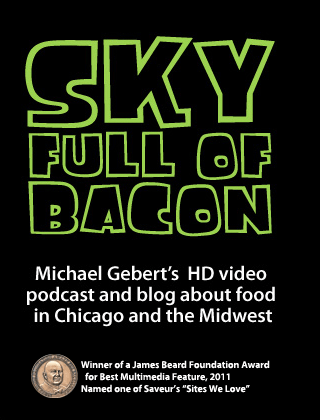
First off: I promise this is not merely going to be an Andy Rooneyish crotchety rant against Facebook and Twitter, though that is territory we will pass through before we arrive at our real destination.
So, vaguely sensing that there might be some advantage to them for making Sky Full of Bacon better known and thus more viewed (which is its point, after all), I joined both Facebook and Twitter. So now I have my Facebook page, Sky Full of Bacon’s Facebook page, and a Twitter feed (I guess you don’t have a Twitter page, you have a feed).
Now all I lack is a reason why I want any of these things. I have posted a few things on Facebook, but only with an enormous amount of self-consciousness which has inhibited me from posting other, more trivial or cryptic things. You know, I can imagine that there are three or four people out there who might read my comments on a restaurant, but I really do not believe that there is, or even should be, an audience for the non-restaurant minutiae of my life (“Walked the dog over the same path we’ve already walked a thousand times. He will probably live to walk it 15,000 more times”), or who needs me to direct them to that British Idol video with the middle-aged woman who sings her heart out (apparently; I haven’t watched it, I’ve just seen 12,000 Facebook links to it), or who will take interest if I post something truly cryptic, as others seem to:
Michael Gebert is wondering why we don’t have utensils for our feet.
I guess I can see the appeal of Facebook, on a chitchat with friends level, even if it’s mostly not for me. Twitter I found even more mysterious at first, its 140 character limit, lack of graphical interest and general tendency toward borderline incomprehensibility bothering the writer in me:
@funguy Plz check out singer wow i couldn believe www.tinnyurl.com/3dkjf387r4
Until I finally realized, that’s not a bug, that’s a killer app. It’s the very fact that you can’t craft well-written prose in Twitter, that all you can do is take your latest brain fart and dispatch it to the world in telegraphese, that makes it appealing. (Okay, we’re getting really close to Andy Rooney here, I know. Hold on.) It’s the great leveller, the fact that Thomas Pynchon and your Aunt Marge both have to write in the same dash-it-off style, that makes Twitter appealing as a way to get the pleasure of blogging your minutiae to the world— without needing the skills to write interestingly, even by the greatly diminished standards of blogdom. It’s a shortcut to an audience— which is what makes that British Idol woman, who went from utter obscurity to world fame without ever having tried to be merely a professional, the perfect Twitter subject. (So what would be the Great American Tweet? @Gatsby money’s great but lost love hauntz— drive safe)
I still have some reservations about this— in many ways I think Facebook gets the virtues of communities like LTHForum exactly backwards. There, I didn’t care about your banal political or TV-viewing or whatever views, and you didn’t care about mine; we met on neutral ground where we had something to contribute, and people who were strangers in every other way could find each other and at least talk food. Now I have to take the people I met somewhere else, and find out how banal each others’ views on everything but food are. Clearly some know how to grow their base of friends via Facebook, but it seems likely to shrink mine.
But beyond that, there’s something really weird about all this that has only slowly dawned on me. Which is, by becoming a publisher to the world, by becoming a one-person media source, as internet technology has allowed me to do, I also take on the curse of all mass media, which is, the curse of having to chase an audience and maintain one’s popularity. In short, of living or dying by the numbers.
This is a problem that ordinary people didn’t have before— that of being able to know exactly how well one’s latest missives are being read or not read, of being able to track one’s popularity in minute ways. Every new form of media comes with some form of feedback. Sometimes it’s quite precise (or at least gives the illusion of such)— I can see exactly how many people watched my podcasts on Vimeo each day, and chart their ebb and flow daily, if I wish. Sometimes it’s a little more secondhand— if no one responds to what I put on Facebook, is it because they rolled their eyes and ignored it, or because I said it so succinctly and perfectly that further comment is superfluous?
One can follow this to quite a neurotic degree if one wishes, self-esteem rising or falling with the numbers, but beyond its crazymaking potential, it also subjects ordinary people to the same pressures that studio execs and TV producers and so on have so often given in to, disastrously for their work— that of tinkering to make this or that a little more appealing to the audience, in hopes of grabbing an extra point or two of audience share or a slightly bigger opening weekend. For someone like me, whose professional life in advertising has often involved being a bit of a stylistic chameleon depending on what product I was writing for, it’s all too easy to imagine creating an ever-more false persona who gives the audience what they want, rather than blogging for one’s self and a certain truthfulness about what you’re doing.
So this is the weird we live now, in which each of us seems to be connected to a Nielsen home (or, as Herman Mankiewicz said when Columbia chief Harry Cohn explained that a picture was good if he didn’t wriggle in his seat, “Imagine—the whole world wired to Harry Cohn’s ass!”) For some this will be fine; blogging will be a business, and the business will involve projecting an image which is only tenuously related to any reality, and the more popular it gets, the better.
Me, I don’t want to live like that, and maybe I can say that because it’s still not a business for me, it’s a mildly lucrative hobby. I want an audience, sure, but I don’t want to do anything to get it, for the sake of my own truthfulness, my own journey (to use a cliche of the moment), I want to maintain a little of the sangfroid toward audience-pandering that T.E Lawrence had. When he first came back from Arabia, he arranged to have published, privately, his journal of his experiences (what would eventually become Revolt in the Desert). The printer asked how many copies he wanted, and so he replied that he had estimated the intelligent audience in England for an account of what was really going on in the middle east, and he had determined… nine copies.
Then, when they arrived, he decided he had been overoptimistic, and destroyed two of them.


 If you like this post and would like to receive updates from this blog, please subscribe our feed.
If you like this post and would like to receive updates from this blog, please subscribe our feed.




